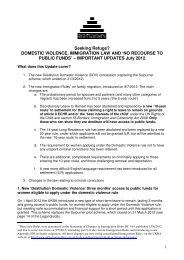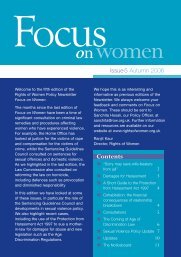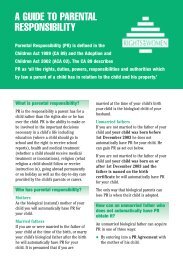Seeking Refuge? - Rights of Women
Seeking Refuge? - Rights of Women
Seeking Refuge? - Rights of Women
You also want an ePaper? Increase the reach of your titles
YUMPU automatically turns print PDFs into web optimized ePapers that Google loves.
Your legal representative is the person who<br />
advises you on the law and your rights. Your<br />
legal representative may be a solicitor or an<br />
immigration advisor. A solicitor is a qualified<br />
lawyer who is responsible for dealing with the<br />
preparation <strong>of</strong> cases. Some solicitors may also<br />
represent their clients in courts or tribunals.<br />
Solicitors are represented by the Law Society<br />
www.lawsociety.org.uk and are regulated by<br />
the Solicitors Regulation Authority<br />
www.sra.org.uk An immigration advisor is<br />
someone who is not a solicitor, but who is<br />
able to give immigration law advice. For<br />
information about immigration advisors<br />
contact the Office <strong>of</strong> the Immigration Services<br />
Commissioner www.oisc.gov.uk<br />
Depending on your financial circumstances<br />
and the merits <strong>of</strong> your case, you may be<br />
entitled to public funding (also known as<br />
legal aid). Public funding enables some<br />
people who cannot afford to pay privately to<br />
get legal advice and representation free <strong>of</strong><br />
charge. However, not all legal representatives<br />
do publicly-funded work and there are limits<br />
on the work that a publicly-funded legal<br />
representative can do on a case. For further<br />
information about public funding and getting<br />
legal advice talk to your legal representative or<br />
contact Community Legal Advice<br />
www.communitylegaladvice.org.uk<br />
If you are not entitled to public funding, you<br />
may have to pay for legal advice or, if you<br />
cannot afford this, represent yourself.<br />
What will happen when my case<br />
is considered?<br />
You should be contacted when your case is going to<br />
be considered by the Case Resolution Directorate.<br />
The Case Resolution Directorate will contact you,<br />
rather than any legal advisor you may have had in<br />
the past. It is therefore important that the Case<br />
Resolution Directorate knows your address.<br />
You may be asked to complete a questionnaire<br />
which will ask you the reasons why you want to<br />
stay in the UK. The letter you get will say when<br />
the questionnaire has to be completed and<br />
returned to the UK Border Agency. It is important<br />
to complete the questionnaire on time. If you are<br />
not sent a questionnaire, it is because the Case<br />
Resolution Directorate believes that it has all the<br />
information it needs to make a decision on your<br />
case. You cannot photocopy another person’s<br />
questionnaire and send it to the Case Resolution<br />
Directorate. If you do this it will not lead to your<br />
case being considered.<br />
Whether or not you are asked to complete a<br />
questionnaire, it is important to seek legal advice<br />
as soon as you are contacted by the Case<br />
Resolution Directorate.<br />
Your legal representative can ensure that the<br />
questionnaire is completed correctly and / or that<br />
the Case Resolution Directorate has all the<br />
information it needs to make a decision on your<br />
case.<br />
Once the questionnaire has been returned to the<br />
Case Resolution Directorate, your case will be<br />
given to a case-owner, who will be responsible for<br />
resolving your case. You can and should continue<br />
to provide updated information to the Case<br />
Resolution Directorate after you have sent back<br />
your questionnaire. You may have to attend an<br />
interview with a case-owner. For more<br />
information about interviews, see Chapter 5.<br />
There are some people who may not be contacted<br />
by the Case Resolution Directorate before a<br />
decision is made on their case. This may be<br />
because there is a risk that the person will<br />
disappear, or because they are considered to be a<br />
threat to the public (because they have committed<br />
serious criminal <strong>of</strong>fences). Finally, a person may<br />
not be contacted because the Case Resolution<br />
Directorate is going to take steps to remove them<br />
from the UK. If you are taken into detention, seek<br />
legal advice immediately. For information about<br />
removals, see Chapter 9.<br />
How does the Case Resolution<br />
Directorate make decisions?<br />
There are no published rules that say how cases<br />
dealt with by the Case Resolution Directorate<br />
should be decided. However, the Case Resolution<br />
Directorate should follow paragraph 395C <strong>of</strong> the<br />
Immigration Rules when making decisions, as<br />
well as looking at the law that determines who is<br />
entitled to protection in the UK.<br />
38
















